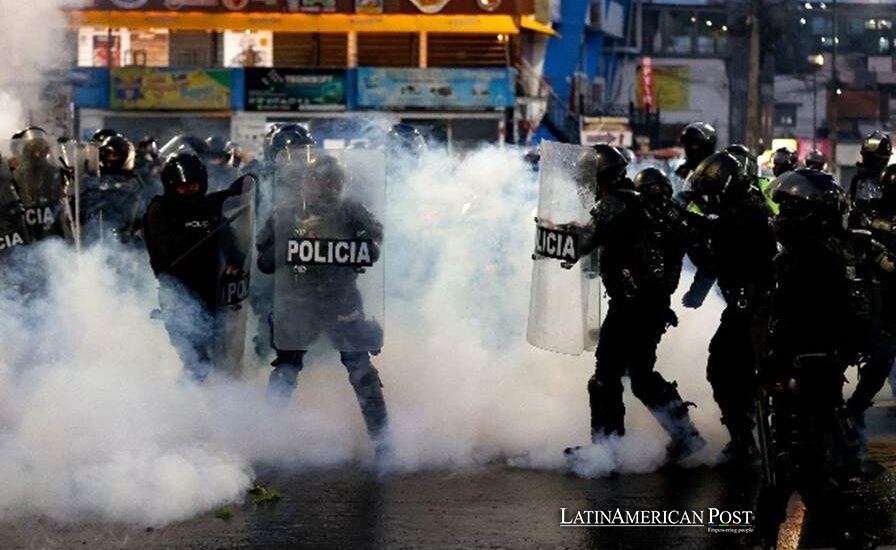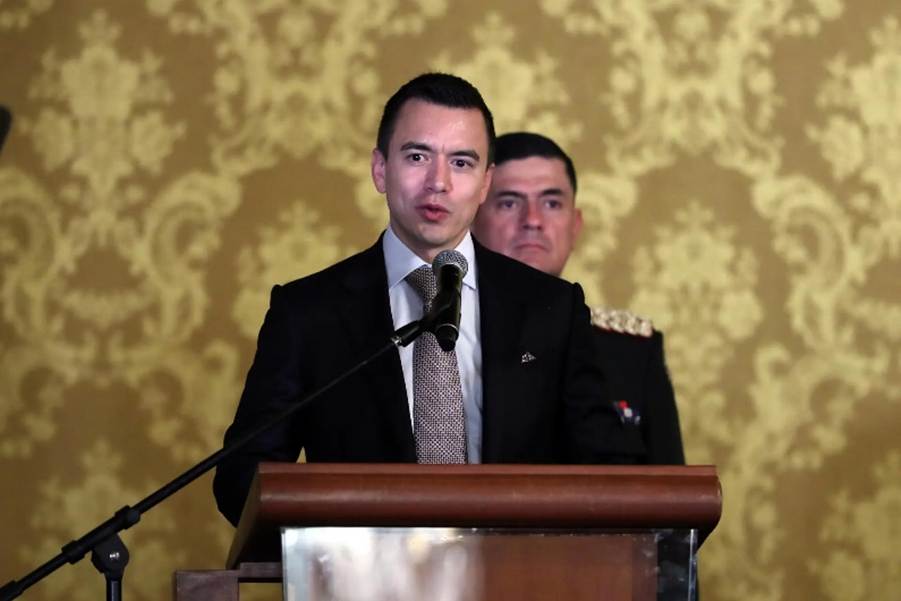Ecuador On Edge As Noboa Balances War, Austerity, And Power

Two years into his presidency, Ecuador’s Daniel Noboa faces his first political defeat, rising violence and public anger over austerity, even as he deepens ties abroad and insists his security doctrine is the only way to rescue the country now.
A Stinging Referendum And A Shaken Mandate
On Sunday, President Daniel Noboa marks two years in power with bruises still fresh from his biggest political setback yet. Just a week earlier, Ecuadorians delivered a resounding “no” at the polls, blocking his plans to rewrite the constitution and exposing the depth of public unease with his leadership.
Noboa first reached the presidency in 2023, finishing the term of Guillermo Lasso (2021–2025) after snap elections. This year he secured re-election through 2029, seemingly consolidating his hold on power. But the referendum of November 16 told a different story. According to results cited by EFE, voters rejected all four questions he put to them. Almost 62 percent opposed convening a constituent assembly to draft a new constitution, and about 61 percent said no to allowing foreign military bases back into the country.
Ecuadorians also resisted Noboa’s attempts to drastically alter their political system. A majority refused to reduce the number of members of the National Assembly, and nearly 58 percent rejected eliminating public financing for political parties. For a president who had framed the plebiscite as a mandate for change, the message was clear: voters are wary of concentrating power further, especially in a country that has already lived through volatile constitutional experiments.
The defeat landed at an awkward moment. Noboa had been trying to present himself as the leader capable of restoring order and stability after years of economic turbulence and surging criminal violence. Instead, the referendum turned into a kind of midterm verdict on his methods, suggesting that even if many Ecuadorians share his fears about insecurity, they do not trust him enough to hand him a blank check.
Austerity, IMF Discipline And Everyday Discontent
On paper, the economy has shown signs of life. By September 2025, Ecuador’s GDP was growing at an annual rate of 4.8 percent, driven by recovering service, manufacturing, trade, oil and mining sectors, according to figures reported by EFE. But behind those numbers lies a brutally tight fiscal corset that is reshaping daily life.
Under a four-year, five-billion-dollar credit agreement with the International Monetary Fund, running from 2024 to 2028, Noboa has embraced a program of budget discipline that few politicians would envy. He raised value-added tax from 12 to 15 percent, trimmed subsidies on the most widely consumed gasoline and completely scrapped the diesel subsidy. The government also cut the number of ministries and announced the dismissal of 5,000 public employees.
These moves have helped “put public accounts in order,” as his team likes to say, and international lenders have taken note. But ordering the books has not meant solving the problems that dominate Ecuadorians’ daily conversations. Noboa has been hammered by critics for failing to rescue a health system creaking under shortages and delays, even as taxes rise and subsidies disappear. For many citizens, the promise of macroeconomic stability feels abstract compared to the very concrete reality of longer bus rides, higher fuel costs and overcrowded clinics.
That tension—between the applause of international creditors and the frustration of voters—is one of the central contradictions of Noboa’s second year. He has chosen a path of fiscal orthodoxy in a country with fragile institutions and deep social demands, and November’s referendum suggests that patience with that gamble may be wearing thin.

War On Gangs, Prisons In Crisis
If austerity defines Noboa’s economic agenda, war defines his security policy. In 2024 he took the extraordinary step of declaring an “internal armed conflict” against criminal gangs, formally reclassifying them as “terrorists.” The shift allowed the military to take on a larger role in domestic operations, and under his administration several leaders of major criminal groups have been captured, a fact government officials highlight in interviews with EFE.
Security is the central pillar of his narrative: a country under siege, a president at war, and a promise to confront gangs “without fear.” Yet the violence has not receded. Despite the offensive, Ecuador remains at the top of Latin America’s homicide rankings, with projections suggesting the country could close 2025 with a record 52 murders per 100,000 inhabitants. The statistic undercuts the government’s triumphalist tone and fuels the perception that the state is chasing a moving target it still does not fully control.
Nowhere is the crisis more visible than behind prison walls. In recent years, Ecuador’s jails have become epicenters of massacres as rival gangs fight for control. Even after Noboa placed prisons under military and police control, the bloodshed has not fully stopped. Seeking to reassert authority, he pushed ahead with construction of a new high-security facility, the Cárcel del Encuentro. Although the prison is still being finished, the government has already moved around 300 inmates there, described as the “most dangerous,” including former vice president Jorge Glas, convicted on corruption charges.
The transfer of Glas would soon trigger one of Noboa’s most explosive decisions. In April 2024, police stormed the Mexican embassy in Quito to detain the former vice president after Mexico granted him asylum. The raid, widely condemned abroad and detailed in EFE’s coverage, broke one of the oldest diplomatic taboos—the inviolability of embassies. Mexico severed relations, both countries filed lawsuits in international courts, and Noboa’s image as a pragmatic modernizer collided with accusations that he was willing to bulldoze international norms to get his way.
Courts, Streets And Ecuador’s Place In The World
Inside Ecuador, Noboa enjoys a relatively calm relationship with the National Assembly, where his allies hold sway and open confrontations have been limited. The real friction lies elsewhere: in the Constitutional Court, which has emerged as practically his only institutional counterweight. The court has suspended several of his flagship laws, including measures he deemed essential to fight crime, prompting anger in the presidential palace.
Noboa responded not only with legal appeals but with politics in the streets. He led two marches against the judges, while his government accused them of being “enemies of the citizens.” For his critics, that rhetoric echoes a broader regional trend of executives trying to delegitimize courts that dare to block their agenda. For his supporters, it is the frustration of a president trying to govern with his hands tied.
Beyond Ecuador’s borders, Noboa has sought to tell a different story. The United States has become his strategic partner of choice, particularly in the fight against organized crime. Security cooperation, intelligence sharing and equipment have deepened, as both governments frame Ecuador’s violence as part of a broader transnational challenge.
At the same time, Noboa has tried to project Ecuador as a country open to the world, not just dependent on Washington. He has promoted closer ties with Europe and Asia, courting trade and cooperation agreements, and knocked on the doors of multilateral organizations to secure financing and technical assistance, especially on security and development.
Two years in, his Ecuador is a country under tight fiscal control but seething public frustration, under declared “internal war” yet still terrified by homicide statistics, diplomatically assertive yet frequently on the defensive. After the shock of the referendum defeat, the question hanging over Quito is whether Noboa will adjust course—or double down on a model that has put stability, sovereignty and the rule of law into the same uneasy sentence.
Also Read: Brazil Becomes China’s New Power Bridge in Latin America





